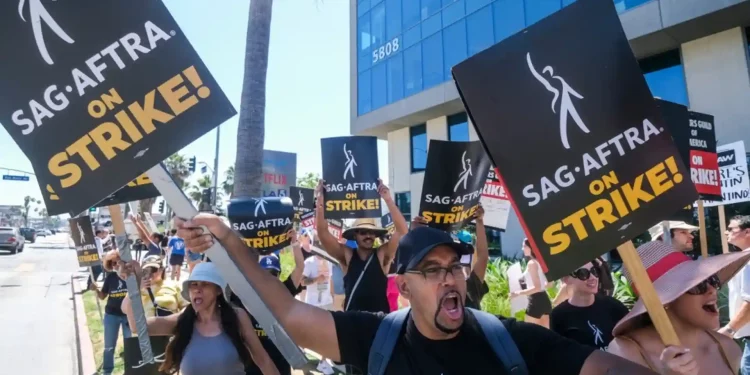The agreement delivers the largest contract-on-contract gains in the history of Sag-Aftra, including the most substantial increase in minimum wages in four decades
In a historic turn of events, Hollywood actors are set to end their nearly fourth-month strike, the Sag-Aftra union announced, bringing a close to a work stoppage that paralyzed the film and television industry for months. Sag-Aftra, the prominent actors’ union, and the Alliance of Motion Picture and Television Producers (AMPTP) reached a tentative agreement, marking the end of the film and television actors’ longest strike. Negotiations resumed last week after stalled talks in early October.
The union stated that they had achieved a deal of extraordinary scope valued at over $1 billion. Key accomplishments of this agreement include larger-than-expected increases in minimum compensation, the introduction of a “streaming participation bonus” for the first time, and “unprecedented provisions for consent and compensation that will protect members from the threat of AI”.
Hollywood producers celebrated the tentative deal, asserting that it established a new model for the industry. The agreement delivers the largest contract-on-contract gains in the history of Sag-Aftra, including the most substantial increase in minimum wages in four decades, a new residual for streaming programs, and extensive consent and compensation protections concerning the use of artificial intelligence.
The new contract is hailed for providing actors with the pay increases and safeguards they need to build sustainable careers across various categories, benefiting many thousands of performers now and into the future.
The preliminary deal reached with AMPTP, representing major media companies like Walt Disney and Netflix, means that Hollywood can return to full production for the first time since May, pending the ratification of the deal by union members in the coming weeks.
The strike sought to increase base pay for residuals and comprehensive regulations governing the use of artificial intelligence in film and television, concerns that were shared by writers during their contract negotiations.
The strike began in July, with prominent actors participating on picket lines in Los Angeles and New York and garnering support for the cause. The full details regarding the agreement have not been disclosed yet. The union mentioned that further details regarding the deal would be disclosed on Friday, during which the board members will review the contract.
During the final stages of negotiations, Netflix CEO Ted Sarandos expressed the studio’s commitment to reaching an agreement, signaling their willingness to accommodate the union’s demands.
The agreements achieved by actors’ and writers’ unions in the fall are seen as a capitulation by major Hollywood companies. It marks a stark reversal for studio executives who initially expected compliance from the unions.
The AMPTP expresses its satisfaction with the tentative agreement and looks forward to the industry’s return to storytelling. The strike had significantly impacted the film and TV production, leading to delayed release dates and a financial and emotional toll on actors.
With the strike’s conclusion, actors can swiftly return to movie sets where productions were halted. The production of other movies and shows will resume as returning writers complete scripts.
The end of the strike enables actors to engage fully with the awards season, with Hollywood’s red carpets, talk shows, and other entertainment sectors returning to their usual state. The end of the strike announcement coincided with Disney CEO Robert Iger and Warner Bros Discovery CEO David Zaslav reporting their latest earnings. Both executives expressed hope for a quick resolution to the strike. Disney’s shares increased based on its report, showing a significant jump in net income. On the other hand, Warner Bros Discovery reported losses, leading to a decline in its shares.
The recent developments in Hollywood mark a turning point in the industry’s labor dynamics, with actors and writers successfully advocating for substantial gains and safeguards in an evolving entertainment landscape. The effects of these agreements are expected to shape the future of Hollywood and ensure the protection and welfare of those working with it.


















